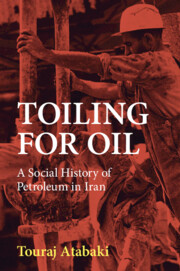Book contents
- Toiling for Oil
- Toiling for Oil
- Copyright page
- Dedication
- Contents
- Figures
- Maps
- Tables
- Note on Transliteration
- Preface and Acknowledgments
- Chronology
- Introduction
- 1 Oil Discovery and the Formation of a New Iranian Society
- 2 Oil and Labour in the First World War
- 3 Oil and Authoritarian Modernisation During Interwar Period
- 4 The Second World War: The Great Powers’ Rivalry for Oil
- 5 Poised to Leap: Towards Oil Nationalisation
- 6 Sovereignty’s Interlude: Iran’s Oil in 1951–1954
- 7 From Disparity to Planned Development: 1954–1962
- 8 Oil, Workforce, and the Developmental State: 1960s–1970s
- 9 Shop Floor Labour Activism: From the White to the Islamic Revolution
- Epilogue
- Notes
- Bibliography
- Index
3 - Oil and Authoritarian Modernisation During Interwar Period
Published online by Cambridge University Press: 28 November 2024
- Toiling for Oil
- Toiling for Oil
- Copyright page
- Dedication
- Contents
- Figures
- Maps
- Tables
- Note on Transliteration
- Preface and Acknowledgments
- Chronology
- Introduction
- 1 Oil Discovery and the Formation of a New Iranian Society
- 2 Oil and Labour in the First World War
- 3 Oil and Authoritarian Modernisation During Interwar Period
- 4 The Second World War: The Great Powers’ Rivalry for Oil
- 5 Poised to Leap: Towards Oil Nationalisation
- 6 Sovereignty’s Interlude: Iran’s Oil in 1951–1954
- 7 From Disparity to Planned Development: 1954–1962
- 8 Oil, Workforce, and the Developmental State: 1960s–1970s
- 9 Shop Floor Labour Activism: From the White to the Islamic Revolution
- Epilogue
- Notes
- Bibliography
- Index
Summary
Exploring the pivotal role of oil in the social and economic development of Iran between two World Wars, the era was marked by the establishment of a modern state aimed at ensuring territorial integrity and creating a homogeneous society within defined geographical borders. Such transformative efforts led to the collapse of the Qajar dynasty and the ascent of Reza Shah Pahlavi’s centralised and authoritative government. During this period, extensive social and economic development policies radically transformed the fabric of Iranian society, notably through the state’s substantial role in industrial investment, which significantly increased the number of industrial workers. Despite these broad changes, operations in the oil industry continued as initially established, resulting in dissatisfaction among both Iranian and Indian workers. This discontent gave rise to a series of labour strikes in the 1920s, underscoring the workers’ capacity to influence the shaping of civil society. Concurrently, the imperative for oil revenue coupled with the Iranian government’s insistence on employing local labour precipitated the cancellation of the D’Arcy Agreement and the signing of a new contract in 1933. A crucial term of this contract was the ‘Iranianisation’ of the workforce, which gradually increased the presence of skilled Iranian workers within the industry. This strategic shift not only redefined employment and living conditions but also facilitated the expansion of oil towns, where policies of ethnic and employment segregation were widely implemented, reflecting the broader national goals of integration and societal standardisation.
Keywords
- Type
- Chapter
- Information
- Toiling for OilA Social History of Petroleum in Iran, pp. 70 - 112Publisher: Cambridge University PressPrint publication year: 2024

